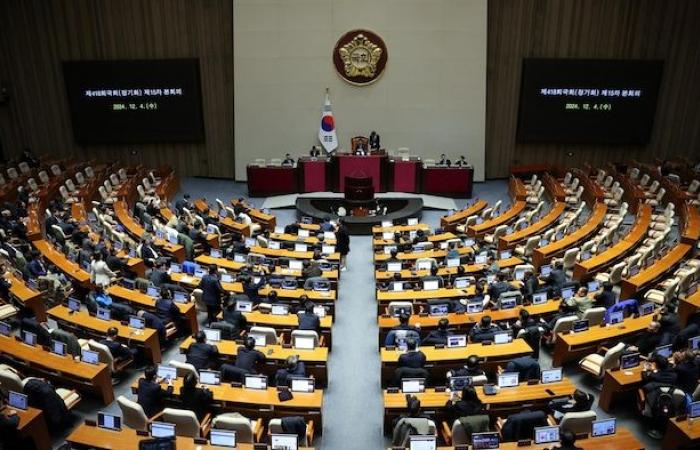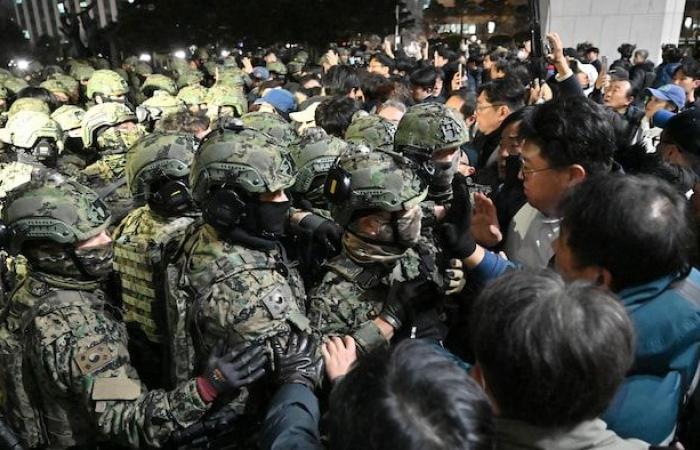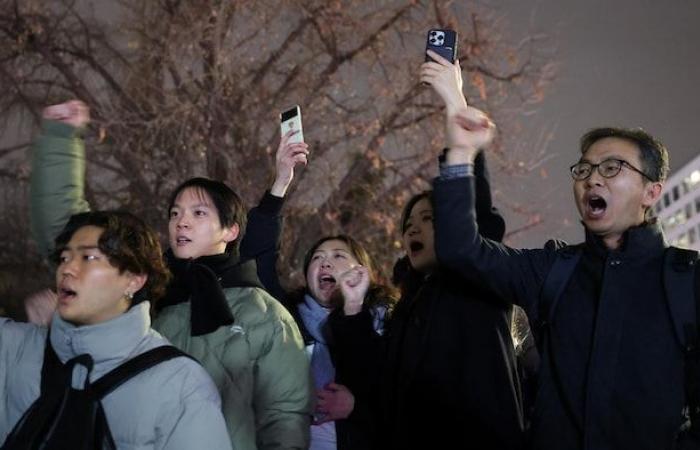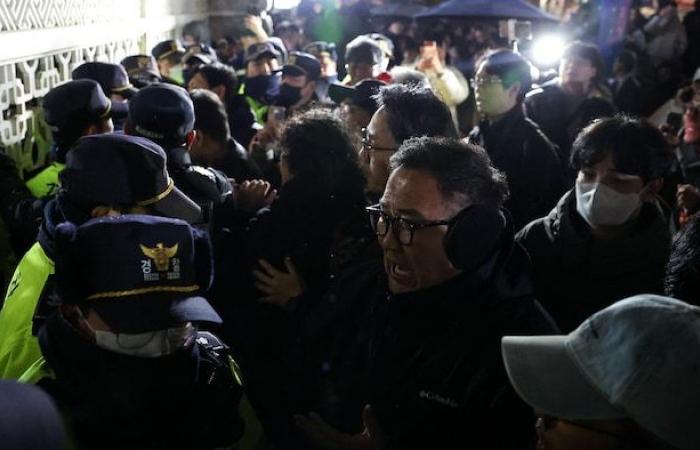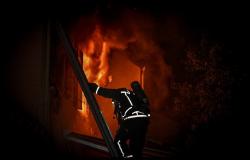A political psychodrama played out in a few hours in Seoul, the South Korean capital, between dusk on Tuesday and dawn on Wednesday, December 4.
For a few hours, Seoul looked like a city under siege, with a National Assembly surrounded by the army, helicopters on the roof, thousands of demonstrators… all this after a president appeared on television , without notice in the middle of the evening, to announce the imposition of a emergency martial law
.
In this speech, President Yoon Suk-yeol, clearly in dire straits, spoke of protect liberal South Korea from threats posed by North Korean communist forces
.
A refuge for criminals
But he also virulently denounced the opposition forces in South Korea itself: Without regard for the livelihood of the people, the opposition party has paralyzed the government for impeachments and special investigations.
Open in full screen mode
A few hours after imposing martial law, the South Korean president changed his mind on December 4, 2024.
Photo : Reuters / Kim Hong-Ji
A statement of great verbal violence: Our National Assembly has become a refuge for criminals, a den of legislative dictatorship which seeks to paralyze the administrative and judicial systems and overthrow our liberal democratic order.
He even accused the opposition forces of complicity with North Korea, even if there is, in the immediate news, no special threat coming from Pyongyang (apart from that represented in itself, and structurally, the proximity of a dictatorship with nuclear weapons).
Since the election last April of a left-wing Parliament (dominated by the Democratic Party), right-wing President Yoon Suk-yeol has been imposed a cohabitation
very hard. Himself elected by a whisker in March 2022 (with 48.6%, compared to 47.8% for his Democratic opponent; a real American score!), he began the fight against the parliamentarians.
A permanent political guerrilla
It is a constant fight, marked by permanent guerrilla warfare, in a country known for its violent clashes, its political corruption, its monster mobilizations in the streets, its dismissals, its political assassinations and its suicide rates. records (including those of prominent figures, such as former President Roh Moo-hyun in 2009).
But all this against a backdrop of real democracy, with real counter-powers, notably judicial and media.
It has already been several weeks since the calls for the resignation of the head of state, and for the establishment of an independent investigation into the affaires
involving his wife, were the slogans of demonstrations organized by the opposition. Just last Sunday, December 1, there were 100,000 people putting pressure on the president in front of Gyeongbokgung Palace, in the heart of Seoul.
A massive and immediate rejection
Mr. Yoon’s announcement was immediately met with massive rejection: that of the majority of opposition politicians and his own party, but also that of a population which, despite the lateness of the hour, was immediately took to the streets. She chanted: Immediate withdrawal of martial law!
, Yoon Suk-yeol, in prison!
or even Yoon Suk-yeol, destitution!
Open in full screen mode
South Korean soldiers attempt to enter parliament in Seoul after the president declared martial law.
Photo : Getty Images / AFP/Jung Yeon-Je
The National Assembly, assembled in disaster in the middle of the night while the streets were full of demonstrators, quickly forced Mr. Yoon to make an about-face. Returning in front of the same television cameras six hours after his first announcement, he himself announced that he was withdrawing the measure and called a meeting of his government to ratify this new decision. According to the Yonhap news agency, the government finally formalized the lifting of martial law in the early morning.
On the night of December 3 to 4, the leap backwards towards dictatorship seems to have been avoided. After four decades of democracy, preceded by 20 years of dictatorship, there will be no relapse, at least this time.
What the Constitution says
Martial law in the South Korean constitution is only envisaged in principle as a response to war or major confrontation with North Korea.
Still, while Pyongyang has taken some worrying steps in recent months – including sending troops to aid Russia’s war in Ukraine – there is no north-south military crisis on the peninsula at the moment that would have could justify the emergency
invoked by the president.
Article 77 of the South Korean Constitution gives the president the power to declare martial law and temporarily enforce special measures
on freedom of speech, assembly and other freedoms in times of national emergency. However, the National Assembly also has the right to demand that the president cancel martial law, by a simple majority vote.
This is also what it did, unanimously (190 to 0), just a few hours after Mr. Yoon’s declaration.
Rough political morals
Despite rough political mores, South Korea, where violence and radicalism periodically emerge, is a country generally classified as a democracy. solid
and has been doing so for three decades. However, if we go a little further into the past, we also find episodes of brutal authoritarianism.
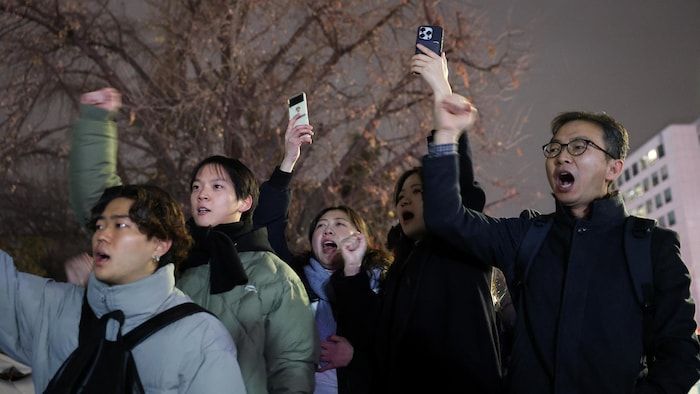
Open in full screen mode
Citizens gathered in large numbers Tuesday evening outside the gates of South Korea’s National Assembly, after its president declared martial law in a televised speech.
Photo : Reuters / Kim Hong-Ji
In the 1960s and 1970s, and until the mid-1980s, South Korea experienced military regimes, mainly that of Park Chung-hee, who came to power democratically in 1962, but who suspended and then abolished the Constitution in the early 1970s, before ending up assassinated in 1979.
The following decade saw a gradual return to democracy, after the tragic episode of Gwangju in May 1980 (popular revolt of a city against the dictatorship, bloodily crushed by the army at the cost of hundreds of deaths).
In the second half of the 1980s – and coinciding with a similar process at the same time in Taiwan – a democratic regime was established, with a new Constitution guaranteeing pluralist democracy, freedom of expression, etc. .
Return of the pendulum
A left-right alternation has taken place. On the international level, it manifests itself through a more or less warm relationship with the United States (the right being more warm
on this level) and by a more or less aggressive relationship with North Korea (the left being warmer to the idea of a north-south rapprochement).
Since the election of Mr. Yoon, in power for two years and eight months, the tone used with Pyongyang has radically changed. We no longer speak lyrically abouta single people who must one day reunite
on the Korean Peninsula; we focus the discourse more on the communist danger and the nuclear peril represented by the grotesque dictatorship of Pyongyang.
However, this return of the pendulum also means a flirtation – especially by this populist president elected by an extremely narrow margin – with the country’s old authoritarian tendencies. With the theme of the enemy from within
which Yoon Suk-yeol explicitly took up in the first of his two dramatic speeches.
The end of Yoon Suk-yeol?
Mr. Yoon’s failed attempt and pitiful about-face undoubtedly herald the end of his presidency. This episode is a real humiliation for him. His presidency was already weakened by the resounding victory of the opposition in the legislative elections of April 2024, by the scandals (the gifts received by his wife), by the long doctors’ strike and by an economy that was still performing well, but having slowed down for three years (almost zero growth in 2023), as well as with a popular approval rate below 30%.
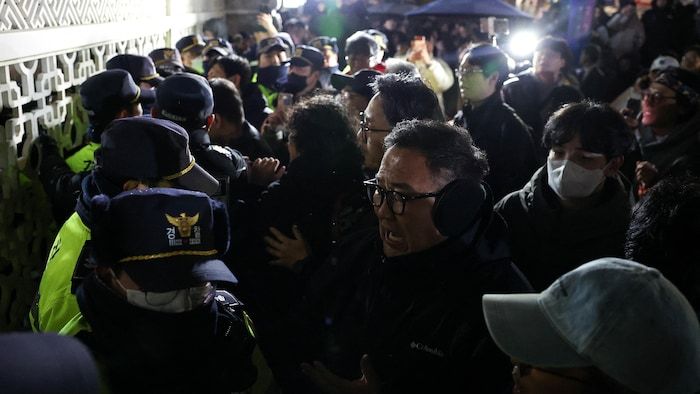
Open in full screen mode
Police guard the gates of South Korea’s National Assembly as citizens attempt to enter, hours after President Yoon Suk-yeol declared martial law Tuesday evening.
Photo : Reuters / Kim Hong-Ji
Even the rapid failure of what is already called the aborted coup
could represent the beginning, rather than the end, of a new political crisis in South Korea.
The episode also recalls the geopolitical problems facing the country: the crazy aggressiveness of Pyongyang; the uncertainty of the American alliance with a Donald Trump not really kind to Seoul; alliances in Europe; and active support for kyiv, at a time of war and North Korea’s direct involvement in Ukraine.
Forty years after the end of the dictatorship in Seoul, 35 years after the end of the Cold War, all this seems like a return to the past.

